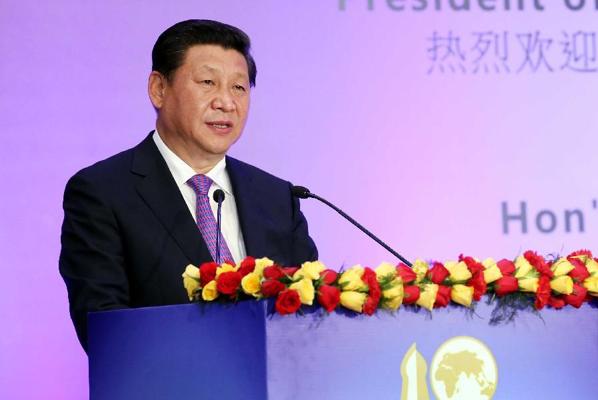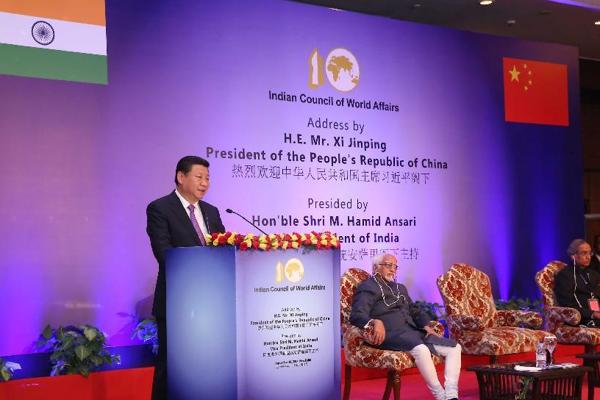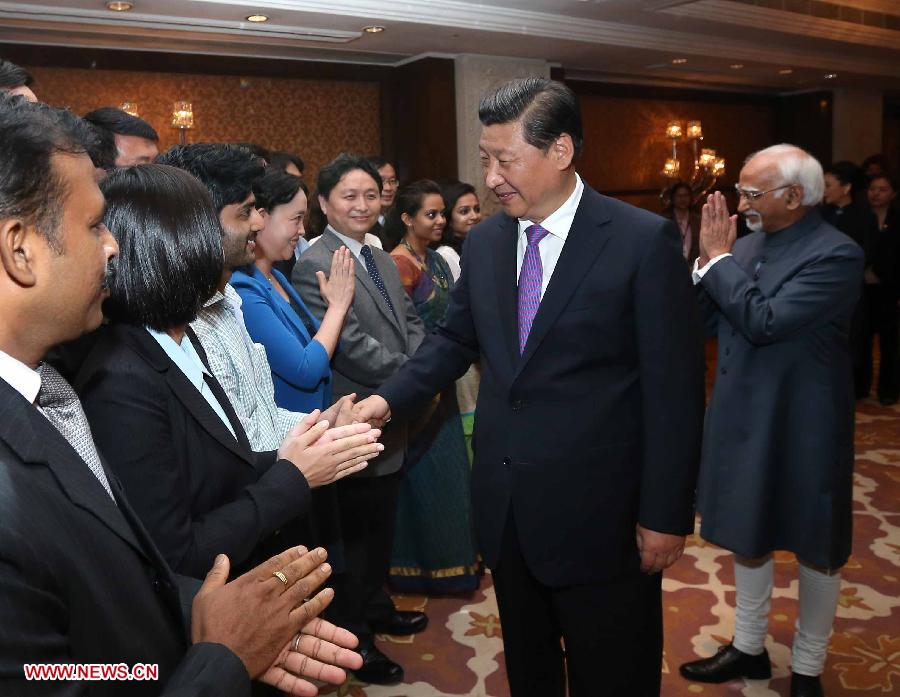
President Xi Jinping delivers a speech at the Indian Council of World Affairs in New Delhi, India, Sept 18, 2014.[Photo/Xinhua]
NEW DELHI--President Xi Jinping said in New Delhi on Sept 18 that China and India should be “express trains” driving regional development, as well as “twin anchors” of regional peace.
“When China and India join hands for cooperation, it will benefit not only the two countries but also the entire Asia and the world at large,” said Xi when delivering a speech at the Indian Council of World Affairs.
He said China-India relations have gone well beyond the bilateral scope and have assumed broad regional and global significance as they have become two major forces in the world’s multi-polarization process and two vibrant forces driving Asian and global economic growth.
China and India should become closer partners for development while jointly pursuing their respective national renewal, Xi said.
“Nothing is more imperative than to deliver a more comfortable, more secure and happier life to the peoples,” he said, adding that both China and India should focus on development, share experience and deepen mutually beneficial cooperation.

President Xi Jinping delivers a speech at the Indian Council of World Affairs in New Delhi, India, Sept 18, 2014.[Photo/Xinhua]
On the regional scale, the two countries should become cooperative partners that lead Asian economic growth and jointly promote prosperity and revitalization of the region, said the president.
To that end, said Xi, China and India should aim to become the “express trains” that drive regional development and work with other countries to push forward regional economic integration and connectivity.
The two Asian neighbors, he added, should also serve as the “twin anchors” of regional peace and commit themselves to building an Asia-Pacific security and cooperation architecture that is open, transparent, equal-footed and inclusive.
In addition, the Chinese leader proposed China and India become global partners for strategic coordination and strive for a just and equal international order.
“China and India have a combined population of over 2.5 billion,” he said. “If we speak with one voice, the whole world will listen, and if we join hands, the whole world will pay attention.”
Xi arrived in India on Wednesday for a three-day visit to the South Asian country. India is the last stop of Xi’s four-nation tour in Central and South Asia, which has already taken him to Tajikistan, the Maldives and Sri Lanka.
In his speech, Xi said China and South Asian countries are important cooperative partners, adding that a peaceful, stable and prosperous South Asia is in line with the interests of nations and peoples in the region as well as the interests of China.

President Xi Jinping meets with youths from China and India after delivering a speech at the Indian Council of World Affairs in New Delhi, India, Sept.18, 2014.[Photo/Xinhua]
The China-proposed initiatives of the Silk Road Economic Belt and the 21st Century Maritime Silk Road, he said, are aimed at strengthening interconnectivity and achieving common prosperity among countries along the historical trade routes.
“Our cooperation, like a massive treasure long-awaited to be unearthed, promises great prospects for us,” Xi said.
He pledged that China will work with South Asian countries to increase bilateral trade to $150 billion, raise its investment in South Asia to $30 billion, and provide $20 billion in concessional loans to the region in the next five years.
Besides, China plans to offer 10,000 scholarships, training opportunities for 5,000 youths and exchange and training programs for 5,000 youths, and train 5,000 Chinese language teachers for South Asia in the next five years.
Noting that China is the biggest neighbor of South Asia and India is the largest country there, Xi said Beijing is ready to work together with New Delhi and make even greater contribution to the development of the region, “so that the three billion people living on both sides of the Himalayas will enjoy peace, friendship, stability and prosperity.”
Xi’s speech drew a 400-strong audience, which included representatives from various sectors of the Indian society and a group of foreign diplomats based in New Delhi.
